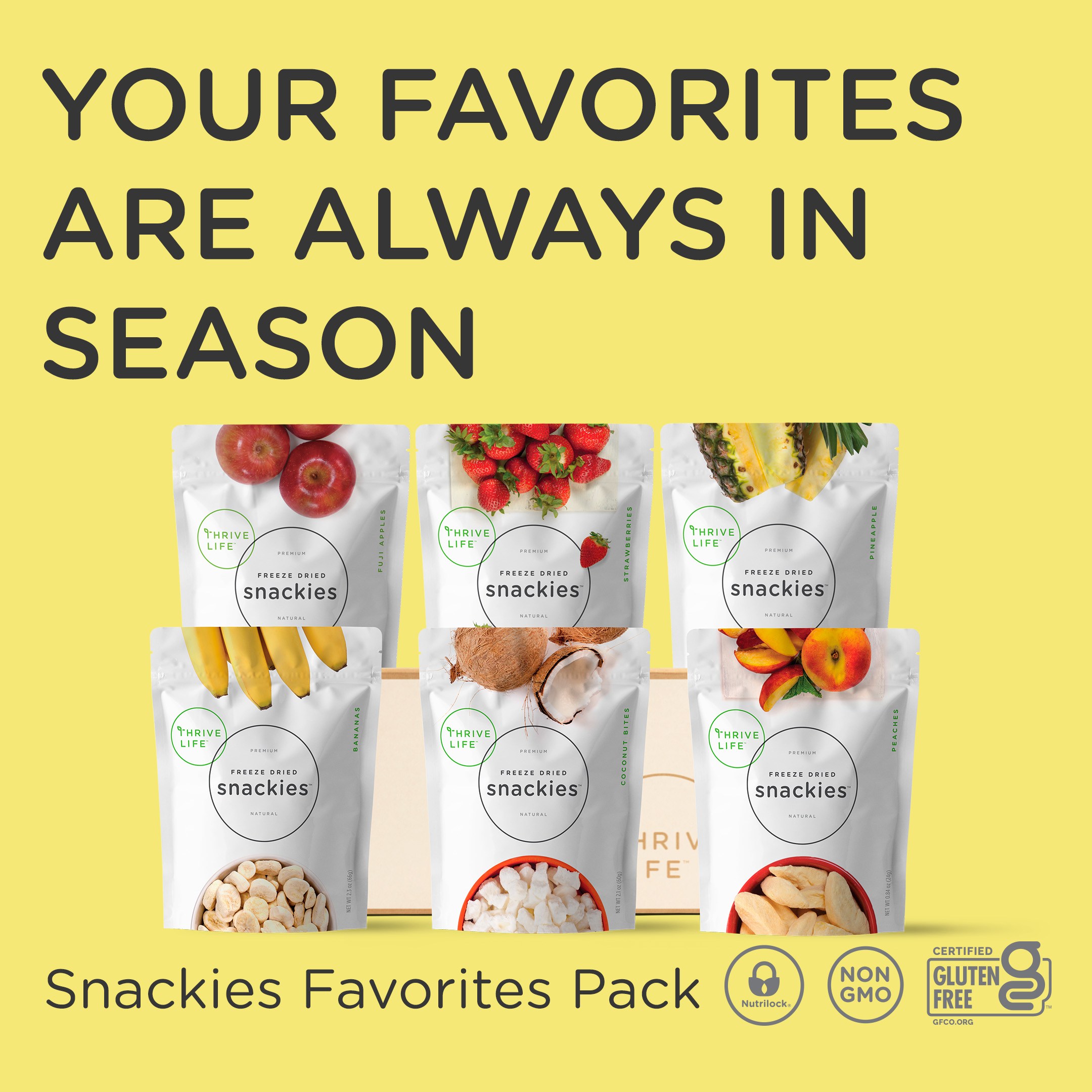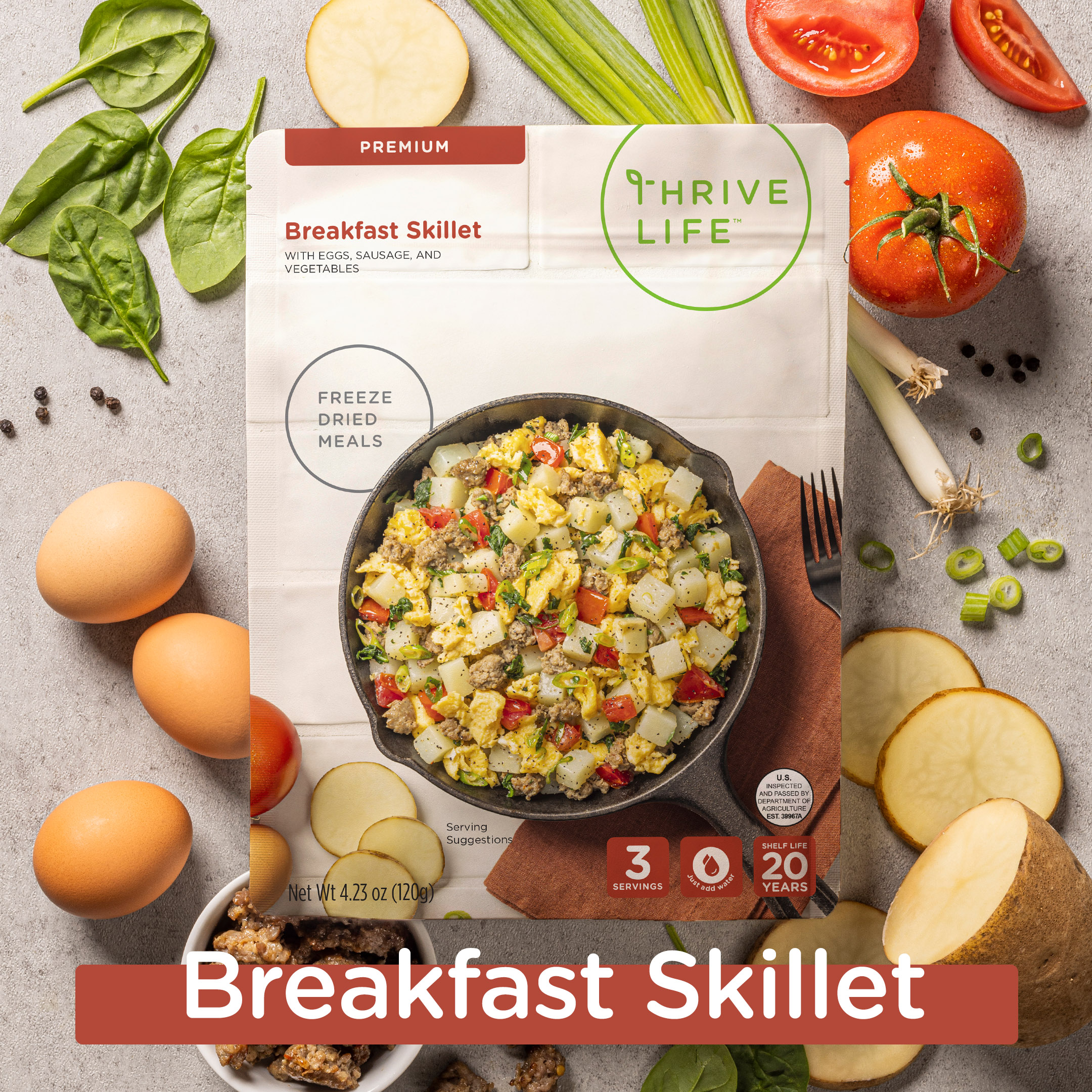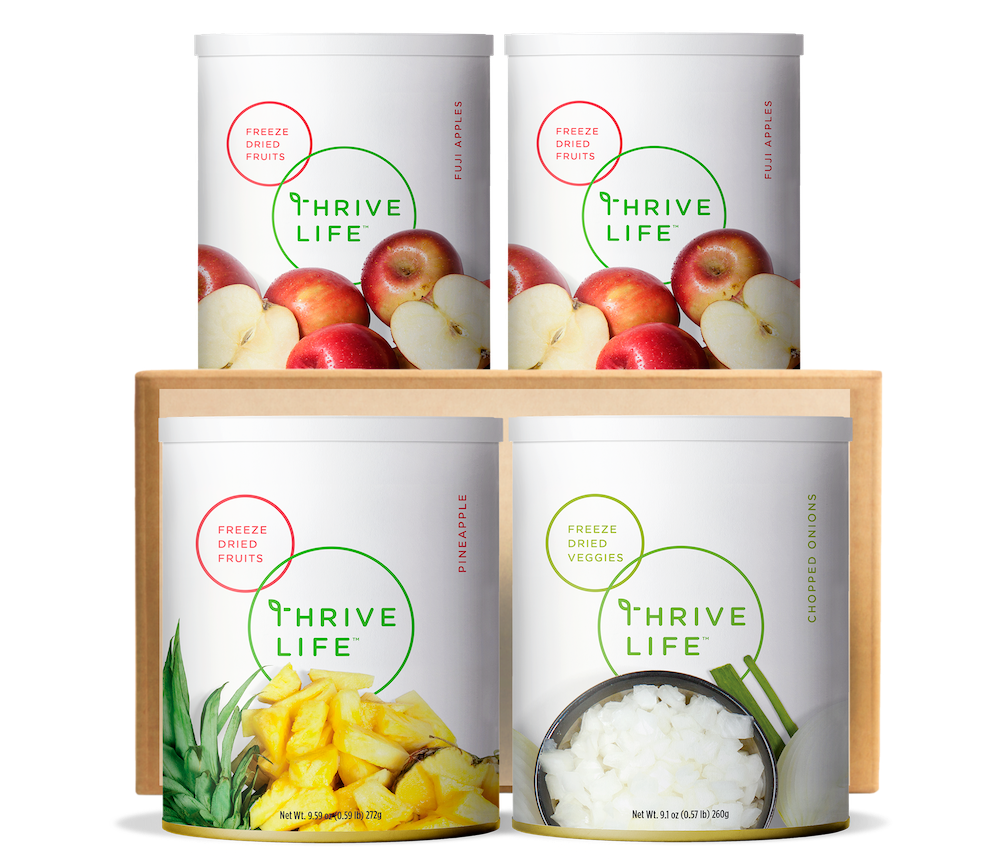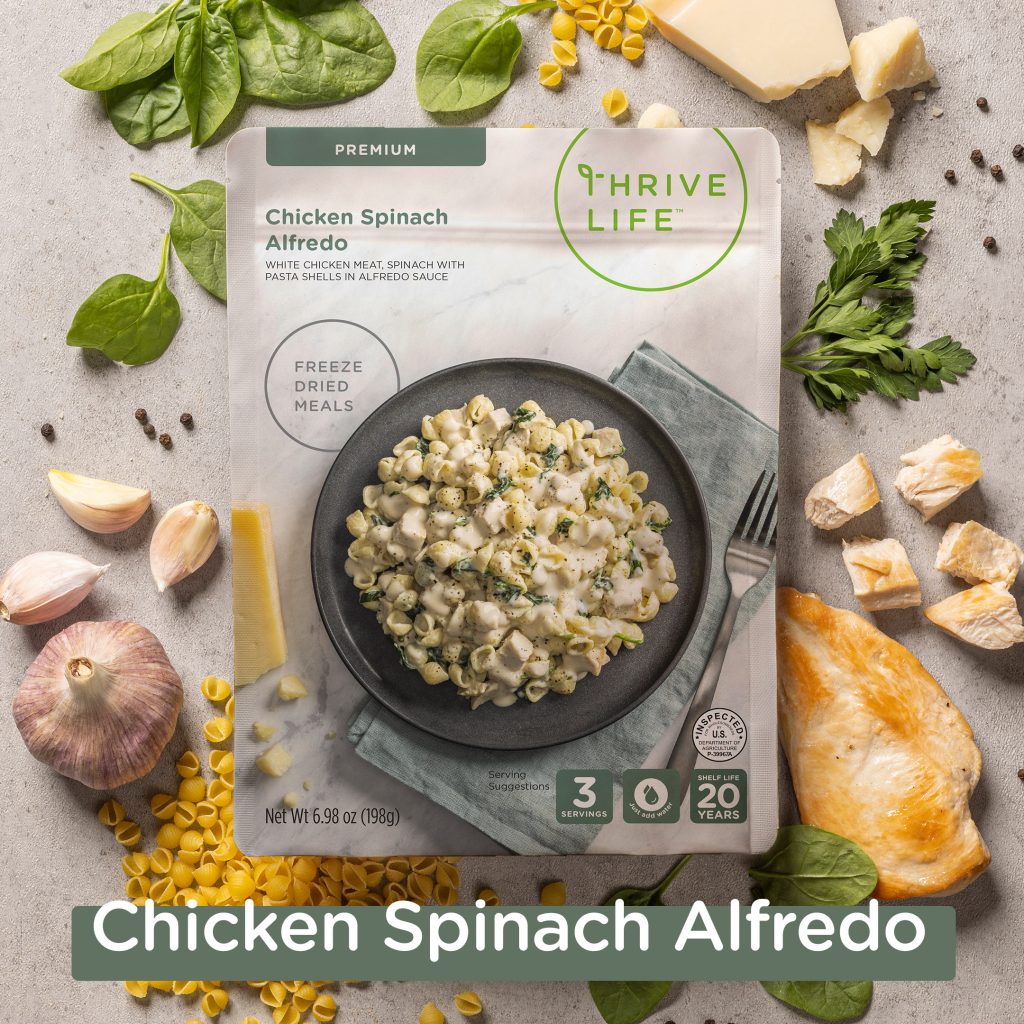Freeze dried food has revolutionized the way we think about long-term food storage and convenience. By removing moisture through a special drying process, these foods retain their nutritional value, ʻono, a me ke kino no nā makahiki, making them the best choice for anyone looking to have reliable, long-lasting food options. Whether you are a prepper planning for emergencies, an outdoor enthusiast in need of lightweight meals, or simply someone who values convenience in the kitchen, freeze dried food offers a versatile solution.
The process of freeze drying involves freezing the food and then reducing the surrounding pressure to remove the frozen water content. This method not only preserves the food but also locks in essential vitamins and minerals. Ma ka hopena, you get a product that is both meaʻai and easy to store. With a shelf life ranging from 5 i 25 makahiki, you can be assured that your investment in freeze dried food is worthwhile.
At Thrive Freeze, we offer a wide array of freeze dried products including fruits, mea kanu, ʻiʻo, pīni, palaoa, and dairy. Our products are manufactured in the USA and meet the highest quality standards. E nānā i kā mākou mau mahina kūikawā no 30-50% mai kā mākou huahana maloʻo maloʻo kiʻekiʻe and discover the ease and reliability that comes with having the best freeze dried food on hand anytime!
Benefits of Freeze Dried Food
One of the most compelling reasons to consider freeze dried food is its impressive array of benefits. ʻO ka mea mua loa, longevity stands out as a key advantage. With a shelf life that can extend up to 25 makahiki, freeze dried foods are ideal for long-term storage, ensuring you always have nutritious options available in times of need.
ʻO kekahi pōmaikaʻi nui ʻo ia ka nutritional retention. Unlike other preservation methods such as canning or dehydrating, freeze drying maintains the majority of the original nutrients. This means you can enjoy the same vitamins and minerals as you would from fresh food, without the worry of nutrient loss over time.
Convenience is another major perk. Freeze dried foods are incredibly lightweight and easy to transport, making them perfect for camping trips, hiking, and other outdoor activities. They also require minimal preparation; hoʻohui wale i ka wai, and your meal is ready to eat. This ease of use extends to everyday cooking as well, saving you time and effort in the kitchen.
Eia kekahi, freeze dried food offers an excellent taste and texture. The freeze drying process preserves the original flavor and texture of the food, providing a much more enjoyable eating experience compared to other preserved foods. This makes it a great option not just for emergencies, but also for daily use.
ʻO ka hope, the variety available in freeze dried products is extensive. From fruits and vegetables to meats and full meals, the options are nearly limitless. This variety ensures that you can maintain a balanced and diverse diet even when relying on long-term food storage.
ʻO nā huaʻai a me nā lau ʻai maloʻo maloʻo
.jpg)
When it comes to incorporating freeze dried foods into your pantry, fruits and vegetables are among the most popular choices. They are not only delicious but also packed with essential nutrients that contribute to a healthy diet. Eia kekahi o ka luna hoʻokuʻu i nā hua maloʻo and vegetables to consider:
Hoʻokuʻu i nā hua maloʻo:
- Strawberries: Known for their sweet and tangy flavor, freeze dried strawberries are a versatile addition to cereals, yogurts, and baked goods.
- Blueberries: These tiny powerhouses are rich in antioxidants and perfect for snacking, adding to smoothies, or mixing into oatmeal.
- Apples: With their crisp texture and natural sweetness, freeze dried apples make an excellent snack or can be rehydrated for use in pies and sauces.
- E hopu wikiwiki: Freeze dried bananas are a great source of potassium and can be easily added to trail mixes or enjoyed on their own.
Hoʻopaʻa i nā mea kanu maloʻo:
- Piʻi: A great source of protein and fiber, freeze dried peas can be used in soups, salakeke, a me nā kīʻaha.
- Brokoli: This nutrient-dense vegetable retains its vitamins and minerals through the freeze drying process, making it a healthy addition to any meal.
- ʻōpae: Hoʻopili ʻia me ka hao a me nā meaʻai pono ʻē aʻe, freeze dried spinach can be easily rehydrated for use in smoothies, pastas, a oi aku.
- Bell Peppers: These colorful vegetables add a burst of flavor and color to any dish, from stir-fries to omelets.
Incorporating freeze dried fruits and vegetables into your diet is a fantastic way to enjoy the benefits of fresh produce without the worry of spoilage. Their ola lōʻihi and ease of use make them a convenient option for busy lifestyles and emergency preparedness alike.
ʻO nā ʻiʻo maloʻo maloʻo maikaʻi loa a me nā protein

Freeze dried meats and proteins are essential for creating balanced, nutritious meals that can be prepared quickly and easily. These products offer an excellent way to ensure you have a steady supply of protein, even when fresh meat isn’t available. Here are some of the best freeze dried meats and proteins to have on hand:
Freeze Dried Meats:
- moa: Freeze dried chicken is incredibly versatile and can be used in a wide variety of dishes, from soups and salads to casseroles and tacos. It’s a lean protein that can add substantial nutrition to your meals.
- Pipi: Whether it’s ground beef or beef chunks, freeze dried beef retains its flavor and texture remarkably well. It’s perfect for stews, chili, a me nā kīʻaha pasta.
- puaʻa: Freeze dried pork is another great option, especially for adding to stir-fries, sandwiches, and breakfast scrambles. It’s both flavorful and versatile.
- Kuleke: With its lean profile, ʻO ka turkey maloʻo maloʻo he koho maikaʻi loa ia no ka poʻe e ʻimi nei e mālama i ka meaʻai olakino. Use it in soups, salakeke, and sandwiches for a protein boost.
Freeze Dried Proteins:
- Piʻi: E hoʻokuʻu i nā pīni maloʻo, e like me ka pīʻeleʻele, pinto beans, and chickpeas, are rich in protein and fiber. They are perfect for vegetarian dishes, kopa, a me nā salakeke.
- Eggs: Freeze dried scrambled eggs are a handy and quick option for breakfast or baking. They provide high-quality protein and can be easily rehydrated.
- Quinoa: ʻOiai ʻaʻole ia he ʻiʻo, quinoa is a complete protein and a fantastic addition to any pantry. It’s perfect for salads, bowls, and as a side dish.
- Tofu: Freeze dried tofu is an excellent plant-based protein that can be rehydrated and used in a variety of dishes, from stir-fries to smoothies.
Having a selection of freeze dried meats and proteins ensures that you can create hearty, nutritious meals even when fresh options are limited. Their ola lōʻihi and ease of preparation make them an invaluable addition to any kitchen.
Essential Freeze Dried Dairy Products

Freeze dried dairy products are a game-changer for those who want to enjoy the benefits of dairy without worrying about spoilage. These products offer the same nutritional benefits as fresh dairy but with a much longer shelf life. Here are some essential freeze dried dairy products to consider:
Freeze Dried Milk:
- Whole Milk: Freeze dried whole milk retains all the rich, creamy flavors and nutrients of fresh milk. It’s perfect for drinking, cooking, baking, or adding to coffee and tea.
- Skim Milk: For those watching their fat intake, freeze dried skim milk is an excellent choice. It’s great for cereal, smoothies, and low-fat recipes.
- Chocolate Milk: A favorite among kids and adults alike, freeze dried chocolate milk powder can be easily reconstituted for a delicious, nutritious drink.
Freeze Dried Cheese:
- Cheddar Cheese: Freeze dried cheddar cheese is versatile and can be used in a variety of dishes, from casseroles and salads to snacks and sandwiches.
- Mozzarella Cheese: Perfect for pizzas, pastas, and lasagnas, freeze dried mozzarella cheese offers the same melt-in-your-mouth texture as fresh mozzarella.
Other Freeze Dried Dairy Products:
- Nahu Yogurt: Freeze dried yogurt bites are a healthy snack option that can be enjoyed on their own or added to cereals and trail mixes.
- Butter Powder: A convenient alternative to fresh butter, freeze dried butter powder can be used in baking, cooking, and as a spread when reconstituted.
- Sour Cream Powder: This is a fantastic addition to your pantry for making dips, dressings, and adding a creamy texture to various dishes.
- Ice Cream: Freeze dried ice cream is a delightful treat that doesn’t require refrigeration. It’s perfect for camping trips, picnics, or as an emergency sweet treat.
Incorporating these essential freeze dried dairy products into your pantry ensures that you always have high-quality dairy available, no matter the circumstances. Their versatility and ola lōʻihi make them indispensable for both everyday use and emergency situations.
How to Store Freeze Dried Food

Proper storage of freeze dried food is crucial to maintaining its longevity and nutritional value. Unlike fresh produce, freeze dried foods have an impressive shelf life of 5-25 makahiki, but only if stored correctly. Here are some key tips on how to store freeze dried food to ensure it stays fresh and delicious:
1. Use Airtight Containers: The most important factor in storing freeze dried food is to keep it in airtight containers. Oxygen is the enemy of long-term food storage, so using vacuum-sealed bags, mylar bags with oxygen absorbers, or tightly sealed canisters can significantly extend the shelf life of your freeze dried products.
2. Cool, Dry, and Dark Storage: Store your freeze dried foods in a cool, dry, and dark place. Exposure to light, wela, and moisture can degrade the quality of the food over time. A pantry, hale lalo, or dedicated food storage area is ideal.
3. Rotate Your Stock: Even though freeze dried foods have a ola lōʻihi, it’s good practice to rotate your stock. Use the oldest items first and replace them with new ones. This ensures that you always have the freshest products available.
4. Keep Away from Strong Odors: Hiki i nā meaʻai maloʻo maloʻo ke komo i nā ʻala ikaika mai ko lākou mau wahi. Store them away from chemicals, cleaning supplies, or any items with a strong smell to prevent flavor contamination.
5. Label and Date: Clearly label and date each container of freeze dried food. This helps you keep track of inventory and ensures you use items within their optimal time frame.
By following these storage tips, you can maximize the shelf life and quality of your freeze dried foods, ensuring you’re always prepared for any situation. Whether it’s for daily use or emergency preparedness, properly stored freeze dried food is a reliable and nutritious option.
E nānā i kā mākou mau mahina kūikawā no 30-50% mai kā mākou huahana maloʻo maloʻo kiʻekiʻe ma thrivefreeze.com!


